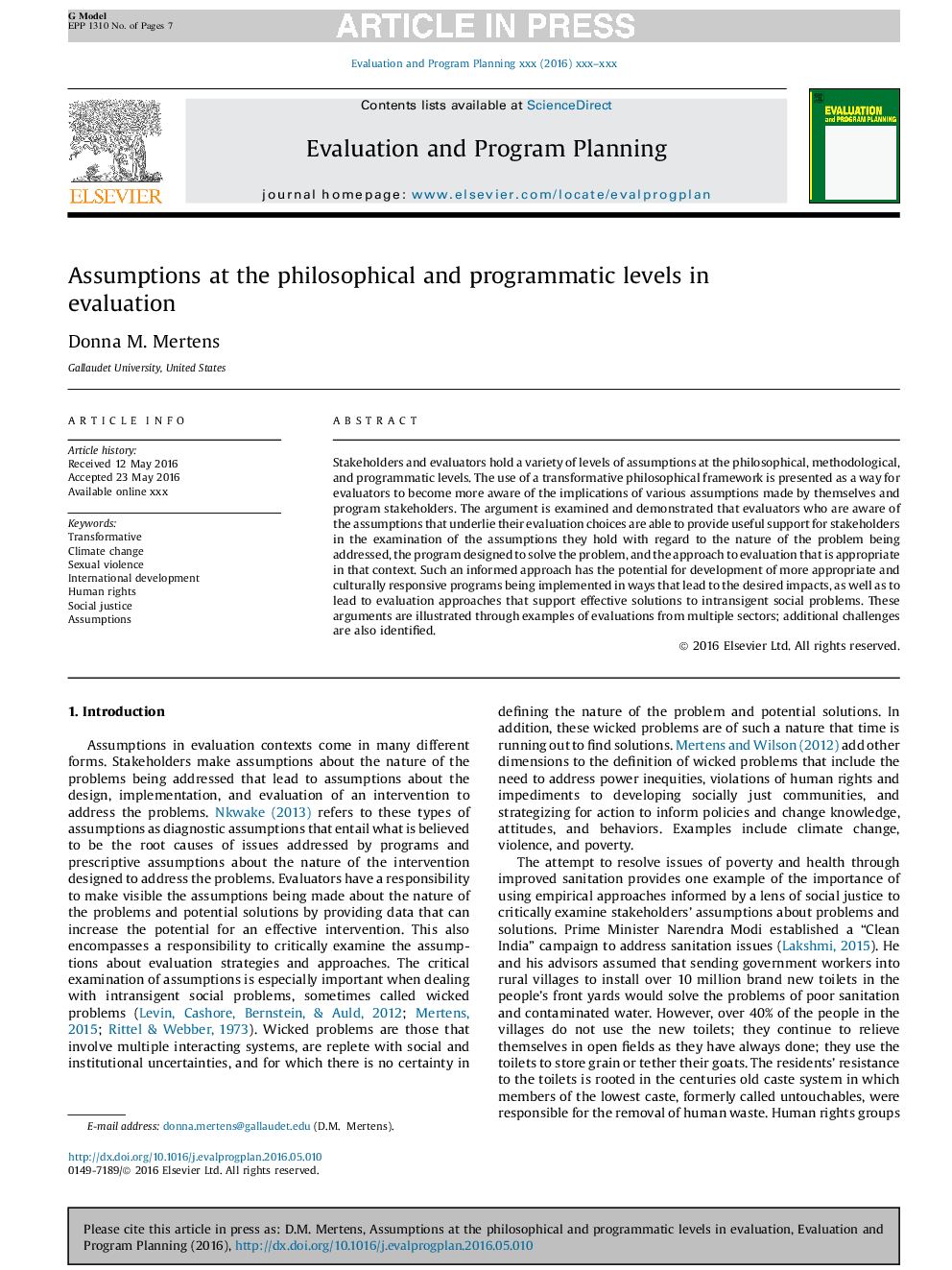| کد مقاله | کد نشریه | سال انتشار | مقاله انگلیسی | نسخه تمام متن |
|---|---|---|---|---|
| 6792410 | 862790 | 2016 | 7 صفحه PDF | دانلود رایگان |
عنوان انگلیسی مقاله ISI
Assumptions at the philosophical and programmatic levels in evaluation
ترجمه فارسی عنوان
اصول در سطوح فلسفی و برنامه ریزی در ارزیابی
دانلود مقاله + سفارش ترجمه
دانلود مقاله ISI انگلیسی
رایگان برای ایرانیان
کلمات کلیدی
ترانسفورماتور تغییر آب و هوا، خشونت جنسی، توسعه بین المللی، حقوق بشر، عدالت اجتماعی، فرضیه ها،
ترجمه چکیده
سهامداران و ارزیابان در سطوح فلسفی، روش شناختی و برنامه ریزی سطوح مختلفی از فرضیه ها دارند. استفاده از یک چارچوب فلسفی تحول یافته به عنوان یک راه برای ارزیابی ها برای آگاهی بیشتر از پیامدهایی از مفروضات مختلف ساخته شده توسط خود و ذینفعان برنامه ارائه شده است. این استدلال مورد بررسی قرار گرفته و نشان داده شده است که ارزیابی کنندگان که از مفروضاتی که بر پایه انتخاب ارزیابی خود هستند آگاه هستند، می توانند در مورد بررسی مفروضاتی که در رابطه با ماهیت مشکلی مطرح می شوند، حمایت قابل توجهی از ذینفعان ارائه دهند، حل مسئله و رویکرد ارزیابی که در آن زمینه مناسب است. چنین رویکردی آگاهانه بالقوه برای توسعه برنامه های مناسب تر و برنامه های پاسخگو فرهنگی است که به شیوهای که منجر به اثرات مورد نظر می شود، و همچنین به ارزیابی رویکردهایی که از راه حل های مؤثر برای مشکلات اجتماعی غیرمستقیم پشتیبانی می کنند، پیاده سازی شود. این استدلال ها از طریق نمونه هایی از ارزیابی ها از چند بخش نشان داده شده است؛ چالش های اضافی نیز شناسایی می شوند.
موضوعات مرتبط
علوم پزشکی و سلامت
پزشکی و دندانپزشکی
سیاست های بهداشت و سلامت عمومی
چکیده انگلیسی
Stakeholders and evaluators hold a variety of levels of assumptions at the philosophical, methodological, and programmatic levels. The use of a transformative philosophical framework is presented as a way for evaluators to become more aware of the implications of various assumptions made by themselves and program stakeholders. The argument is examined and demonstrated that evaluators who are aware of the assumptions that underlie their evaluation choices are able to provide useful support for stakeholders in the examination of the assumptions they hold with regard to the nature of the problem being addressed, the program designed to solve the problem, and the approach to evaluation that is appropriate in that context. Such an informed approach has the potential for development of more appropriate and culturally responsive programs being implemented in ways that lead to the desired impacts, as well as to lead to evaluation approaches that support effective solutions to intransigent social problems. These arguments are illustrated through examples of evaluations from multiple sectors; additional challenges are also identified.
ناشر
Database: Elsevier - ScienceDirect (ساینس دایرکت)
Journal: Evaluation and Program Planning - Volume 59, December 2016, Pages 102-108
Journal: Evaluation and Program Planning - Volume 59, December 2016, Pages 102-108
نویسندگان
Donna M. Mertens,
